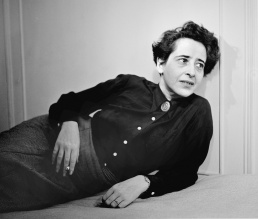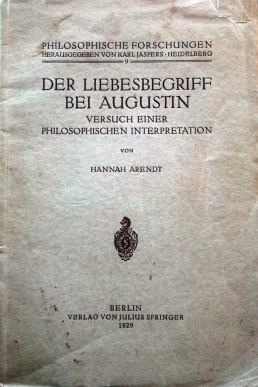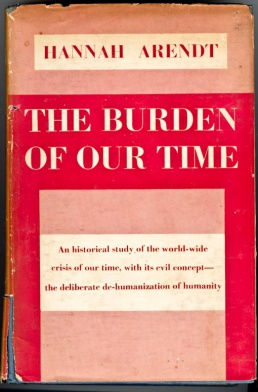Difference between revisions of "Hannah Arendt"
Sorindanut (talk | contribs) (→Essays) |
Sorindanut (talk | contribs) (→Essays) |
||
| Line 81: | Line 81: | ||
===Essays=== | ===Essays=== | ||
| + | * with Charlotte Beradt, ''Die ungarische Revolution und der totalitäre Imperialismus'', Piper. 1958. {{de}} | ||
| + | |||
* ''Von der Menschlichkeit in Finsteren Zeiten: Gedanken Zu Lessing'' [''Humanity in dark times: thoughts on Lessing''], Hamburg: Hauswedell, 1960; Munich: Piper, 1960, [http://libgen.io/book/index.php?md5=3905b9e6046b3a030d7981549fc8f085 PDF], [https://archive.org/details/HannahArendtVonDerMenschlichkeitInFinsterenZeiten1960 IA]. {{de}} | * ''Von der Menschlichkeit in Finsteren Zeiten: Gedanken Zu Lessing'' [''Humanity in dark times: thoughts on Lessing''], Hamburg: Hauswedell, 1960; Munich: Piper, 1960, [http://libgen.io/book/index.php?md5=3905b9e6046b3a030d7981549fc8f085 PDF], [https://archive.org/details/HannahArendtVonDerMenschlichkeitInFinsterenZeiten1960 IA]. {{de}} | ||
** '''MDT''', ''Men in Dark Times'', New York: Harcourt, Brace and World, 1968; 1970, [http://libgen.io/book/index.php?md5=DEC1072377C1212B87A30E3185B76120 PDF]; Harmondsworth: Penguin, 1973. | ** '''MDT''', ''Men in Dark Times'', New York: Harcourt, Brace and World, 1968; 1970, [http://libgen.io/book/index.php?md5=DEC1072377C1212B87A30E3185B76120 PDF]; Harmondsworth: Penguin, 1973. | ||
Revision as of 13:34, 9 August 2015
Johanna "Hannah" Arendt (14 October 1906 – 4 December 1975) was a German-American political theorist and social philosopher.
Contents
Biography
Hannah Arendt was born in 1906 in Hanover. In 1924, after having completed her high school studies, she went to Marburg University to study with Martin Heidegger. The encounter with Heidegger, with whom she had a brief but intense love-affair, had a lasting influence on her thought. After a year of study in Marburg, she moved to Freiburg University where she spent one semester attending the lectures of Edmund Husserl. In the spring of 1926 she went to Heidelberg University to study with Karl Jaspers, a philosopher with whom she established a long-lasting intellectual and personal friendship. She completed her doctoral dissertation, entitled Der Liebesbegriff bei Augustin (LA) under Jaspers's supervision in 1929. She was forced to flee Germany in 1933 as a result of Hitler's rise to power, and after a brief stay in Prague and Geneva she moved to Paris where for six years (1933–39) she worked for a number of Jewish refugee organisations. In 1936 she separated from her first husband, Günther Stern, and started to live with Heinrich Blücher, whom she married in 1940. During her stay in Paris she continued to work on her biography of Rahel Varnhagen, which was not published until 1957 (RV). In 1941 she was forced to leave France and moved to New York with her husband and mother. In New York she soon became part of an influential circle of writers and intellectuals gathered around the journal Partisan Review. During the post-war period she lectured at a number of American universities, including Princeton, Berkeley and Chicago, but was most closely associated with the New School for Social Research, where she was a professor of political philosophy until her death in 1975. (Source)
Works
| Works are in English unless otherwise stated. Green and blue links point to digital versions of publications available on Monoskop or other digital libraries (sometimes using abbreviations). |
Monographs
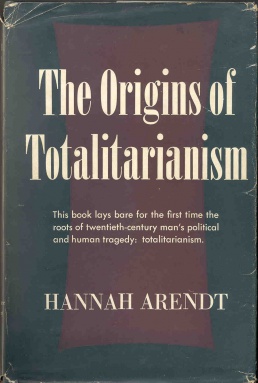


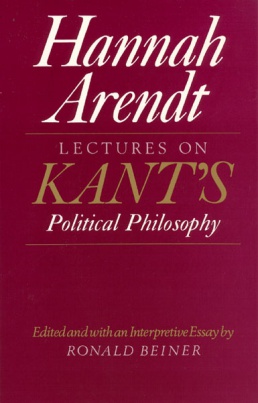
- LA, Der Liebesbegriff bei Augustin. Versuch einer philosophischen Interpretation [The Concept of Love in Augustine. Attempt a Philosophical Interpretation], Berlin: Springer Verlag, 1929. (Doctoral dissertation). (German)
- Il concetto d'amore in Agostino. Saggio di interpretazione filosofica, Milan: SE, 1992. (Italian)
- Love and St. Augustine, trans. Joanna V. Scott and Judith C. Stark, Chicago: University of Chicago Press, 1996.
- OT, The Origins of Totalitarianism [original name: The Burden of Our Time(s), London: Secker and Warburg], New York, 1951; 2nd edition, Cleveland and New York: World Publishing Co., Meridian Books, 1958; reprint, 1962, PDF; 3rd edition, with new prefaces, San Diego/ New York/ London: Harcourt, Brace & World, 1966, 1968, 1973, PDF; 1976; 1979, PDF; revised ed., New York: Schocken, 2004.
- Elemente und Ursprünge totaler Herrschaft, Frankfurt: Europäische Verlagsanstalt, 1955; 1958; 1961; 1962. (German)
- Le origini del totalitarismo, trans. Amerigo Guadagnin, Milan: Edizioni di Comunità, 1967; 1989; 1999; Milan: Bompiani, 1978; Turin: Einaudi, 2004. (Italian)
- Το Ολοκληρωτικό Σύστημα, trans. Γιάννης Λάμψας, Athens [Αθήνα]: Euryalos [Ευρύαλος], 1988, PDF, IA. (Greek)
- Origens do totalitarismo, trans. Roberto, Raposo Sao Paulo: Companhia das Letras, 1989, PDF. (Portuguese)
- Los Orígenes del Totalitarismo, trans. G. Solana, Madrid: Taurus Ediciones, 1974; 1999, PDF. (Spanish)
- Originile totalitarismului, trad. I. Dur şi M. Ivănescu, Bucharest: Humanitas, 2004; 2nd edition, 2006; 3rd edition, 2014, IA. (Romanian)
- HC, The human condition, Chicago: University of Chicago Press, 1958; 2nd ed., 1998, PDF.
- La condición humana, trans. Ramón Gil Novales, Barcelona: Paidós, 1974; 1993; 2003; 2005, PDF. (Spanish)
- Vita activa oder von tätigen Leben, Stuttgart: Kohlhammer, 1960; Munich: Piper, 1967. (German)
- Vita activa, Milan: Bompiani, 1964. (Italian)
- Vita activa. La condizione umana, Milan:, Bompiani, 1989. (Italian)
- Condiţia umană, trans. Claudiu Vereş and Gabriel Chindea, Cluj: Editura Idea Design & Print, 2007, PDF. (Romanian)
- A condição humana, trans. Roberto Raposo, 10th edition, Rio de Janeiro: Forense Universitária, 2007, IA, [1]. (Portuguese)
- İnsanlık Durumu, Istambul: İletişim Yayıncılık, 2008. [2] (Turkish)
- RV, Rahel Varnhagen: The Life of a Jewish Woman, New York: Harcourt Brace Jovanovich, 1958; rev. edition, translated Richard and Clara Winston, 1974; critical edition edited by Liliane Weissberg, Baltimore: The Johns Hopkins University Press, 1997.
- Rahel Varnhagen. Storia di un'ebrea, Milan: Il Saggiatore, 1988; Milan: Net, 2004. (Italian)
- EJ, Eichmann in Jerusalem: A Report on the Banality of Evil, Viking Press, 1963; revised and enlarged edition, 1965. Log
- Eichmann in Jerusalem. Ein Bericht von der Banalität des Bösen, Munich: Piper, 1964. Log (German)
- La banalità del male: Eichmann e Gerusalemme, trans. Piero Bernardini, Milan: Feltrinelli, 1964. Log (Italian)
- Eichmann en Jerusalém, trans. Carlos Ribalta, Barcelona: Lumen, 1999; 2003. (Spanish)
- Eichmann la Ierusalim. Raport asupra banalitatii răului, trans. Mariana Net, Bucharest: Humanitas, 2008, 380 pp. (Romanian)
- CR, Crises of the Republic: Lying in Politics; Civil Disobedience; On Violence; Thoughts on Politics and Revolution, Harmondsworth: Penguin, 1969, PDF; 1972, PDF; 1973.
- PP, The Promise of Politics, The University of the South, 1972, 1975, 2005.
- OV, On Violence, New York: Harcourt, Brace and World, 1970, PDF, Scribd.
- Sulla Violenza, trans. Aldo Chiaruttini, Milan: Arnoldo Monadatori, 1971, PDF IA. (Italian)
- Macht und Gewalt, Munich: Piper, 1975. (German)
- Περί Βίας, trans. Βάνα Νικολαΐδου-Κυριανίδου, Athens [Αθήνα]: Alexandreia [Αλεξάνδρεια], 2000, PDF,IA. (Greek)
- Sobre la violencia, trans. Guillermo Solana, Madrid: Alianza Editorial, 2005; 2006, PDF, IA. (Spanish)
- JP, The Jew as Pariah: Jewish Identity and Politics in the Modern Age, edited and introduction by Ron H. Feldman, New York: Grove Press, 1978.
- Ebraismo e modernità, Milan: UNICOPLI, 1986. (Italian)
- LM, The Life of the Mind, edited by Mary McCarthy, 2 vols. (Volume I: "Thinking", Volume II: "Willing"), New York: Harcourt Brace Jovanovich, 1978; 1981, PDF, IA.
- La vida del espíritu. El pensar, la voluntad y el juicio en la filosofía y en la política, trans. R. Montoro and F. Vallespín, Madrid: Centro de Estudios Constitucionales, 1984, PDF. (Spanish)
- La vita della mente, Milan: Il Mulino, 1987, PDF. (Italian)
- A vida do espírito, trans. Antônio Abranches and Helena Martins, Rio de Janeiro: Relume-Dumará, 1991; 2nd edition, 1992; 3rd edition, 1995; 4th edition, 2000, PDF. (Brazilian Portuguese)
- LK, Lectures on Kant’s Political Philosophy, edited by Ronald Beiner, Chicago: University of Chicago Press, 1992, PDF, PDF.
- Teoria del giudizio politico. Lezioni sulla filosofia politica di Kant, Genova: Il melangolo, 1990. (Italian)
- Conferencias sobre la filosofía política de Kant, trans. Ronald Beiner, Barcelona and Madrid: Paidos Iberica, 2003, PDF. (Spanish)
- Denktagebuch 1950-1973 [Book of Thoughts], 2 vols., Munich: Piper Verlag, 2002, PDF. (German)
- Quaderni e diari, 1950-1973, Vicenza: Neri Pozza, 2007. (Italian)
Correspondence
- Hannah Arendt – Karl Jaspers: Correspondence, 1926–1969, edited by Lotte Kohler and Hans Saner, translated by Robert and Rita Kimber, New York: Harcourt Brace Jovanovich, 1992.
- Between Friends: The Correspondence of Hannah Arendt and Mary McCarthy, 1949–1975, edited and with an Introduction by Carol Brightman. New York: Harcourt Brace & Company, 1995.
- Hannah Arendt/Kurt Blumenfeld, “. . . in keinen Besitz verwurzelt”: Die Korrespondenz, edited by Ingeborg Nordmann and Iris Pilling. Hamburg: Rotbuch Verlag, 1995. (German)
- Hannah Arendt/Heinrich Blücher, Briefe, 1936–1968, edited by Lotte Kohler, Munich: Piper GmbH & Co., 1996. (German)
- Hannah Arendt/Martin Heidegger, Briefe, 1925 bis 1975, edited by Ursula Ludz, Frankfurt: Vittorio Klostermann, 1998. (German)
Essays
- with Charlotte Beradt, Die ungarische Revolution und der totalitäre Imperialismus, Piper. 1958. (German)
- Von der Menschlichkeit in Finsteren Zeiten: Gedanken Zu Lessing [Humanity in dark times: thoughts on Lessing], Hamburg: Hauswedell, 1960; Munich: Piper, 1960, PDF, IA. (German)
- MDT, Men in Dark Times, New York: Harcourt, Brace and World, 1968; 1970, PDF; Harmondsworth: Penguin, 1973.
- Uomini in tempi oscuri: Lessing, Rosa Luxemburg, Papa Giovanni XXIII, Karen Blixen, Milan: Spano, 1968. (Italian)
- L'umanità in tempi bui. Riflessioni su Lessing, Milan: Cortina, 2006. (Italian)
- BPF, Between Past and Future: Six Exercises in Political Thought, New York: Viking Press, 1954, 1957, 1958, London: Faber & Faber, 1961, PDF; revised edition, 1968; New York: Penguin, 1993.
- Tra Passato e Futuro, trans. Tania Gargiulo, Milan: Garzanti, 1991, PDF, IA. (Italian)
- Entre el pasado y el futuro, trans. Ana Poljak, Barcelona: Península, 1996. (Spanish)
- Între trecut şi viitor. Opt exerciţii de gândire politică, trans. Louis Rinaldo Ulrich, Bucharest: Antet, [1997] n.d., PDF. (Romanian)
- OR, On Revolution, New York: Viking Press, 1963; 2nd edition, 1965.
- EU, Essays in Understanding: 1930–1954, edited and introduction by Jerome Kohn, New York: Harcourt Brace & Company, 1994, IA.
- Was ist Politik? Aus dem Nachlaß, Munich: Piper, 1995. (German)
- "Das Phänomen der Revolution" in: Wolfgang Seibel, Monika Medick-Krakau, Herfried Miinkler and Michael Th. Greven, editors, Demokratische Politik. Analyse und Theorie. Politikwissenschaft in der Bundesrepublik Deutschland, Opladen/ Wiesbaden: Westdeutscher Verlag, 1997, PDF. (German)
- with Detlev Schöttker and Erdmut Wizisla, editors, Arendt und Benjamin: Texte, Briefe, Dokumente, Suhrkamp, 2006. (German)
- JW, The Jewish writings, edited by Jerome Kohn and Ron H. Feldman, New York: Schocken, 2007, PDF, IA.
- with Susannah Gottlieb, editor, Reflections on Literature and Culture, Stanford University Press, 2007.
Bibliographies
Literature
- R.J. Bernstein, Hannah Arendt and the Jewish Question, Cambridge: Cambridge UP, 1966.
- M. Canovan, The Political Thought of Hannah Arendt, London: J. M. Dent, 1974.
- Elisabeth Young-Bruehl, Hannah Arendt: For Love of the World, New Haven: Yale University Press, 1982.
- Shiraz Dossa, The Public Realm and the Public Self: The Political Theory of Hannah Arendt, Waterloo, Ontario: Wilfrid Laurier University Press, 1989, PDF.
- Dagmar Barnouw, Visible Spaces: Hannah Arendt and the German-Jewish Experience, Baltimore: The Johns Hopkins University Press, 1990.
- Maurizio Passerin d’Entrèves, The Political Philosophy of Hannah Arendt, London and New York: Routledge, 1994, PDF.
- L. Disch, Hannah Arendt and the Limits of Philosophy, Ithaca: Cornell University Press, 1994.
- Elzbieta Ettinger, Hannah Arendt/Martin Heidegger, New Haven: Yale University Press, 1995.
- C. Calhoun and J. McGowan, editors, Hannah Arendt and the Meaning of Politics, Minneapolis: University of Minnesota Press, 1997.
- Elzbieta Ettinger, Hannah Arendt/Martin Heidegger, New Haven, 1997.
- Hanna Fenichel Pitkin, The Attack of the Blob: Hannah Arendt's Concept of the Social, Chicago: University of Chicago Press, 1998.
- Jennifer Ring, The Political Consequences of Thinking: Gender and Judaism in the Work of Hannah Arendt, New York: State University of New York Press, 1998, PDF.
- John McGowan, Hannah Arendt. An Introduction, Minneapolis and London: University of Minnesota Press, 1998, IA.
- Peter Baehr, editor, The portable Hannah Arendt, London: Penguin Classics, 2000, PDF, IA.
- Steven Aschheim (ed.), Hannah Arendt in Jerusalem, Berkeley, 2001.
- Dana Villa (ed.), The Cambridge companion to Hannah Arendt, Cambridge, 2001, PDF, 2006; 2010.
- R. Berkowitz with T. Keenan and J. Katz, editors, Thinking in Dark Times: Hannah Arendt on Ethics and Politics, New York: Fordham University Press, 2009.
- Simon Swift, Hannah Arendt, London and New York: Routledge, 2009.
- P. Baehr, Hannah Arendt, Totalitarianism, and the Social Sciences, Stanford: Stanford University Press, 2010.
- Anna Yeatman et al., editors, Action and Appearance: Ethics and the Politics of Writing in Hannah Arendt, Continuum, 2011, IA.
- Liisi Keedus, The Crisis of German Historicism: The Early Political Thought of Hannah Arendt and Leo Strauss , Cambridge: Cambridge University Press, 2015, PDF.
- more Literature
